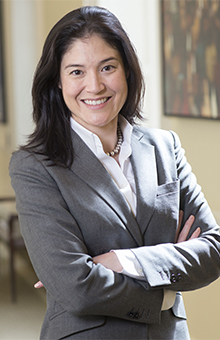 The new director of the UCT Graduate School of Business (UCT GSB), Dr. Catherine Duggan, believes that business schools can play an important role in rebuilding in the wake of COVID-19 – and that they have a special responsibility to take the lead in crafting healthier and more equitable societies and economies.
The new director of the UCT Graduate School of Business (UCT GSB), Dr. Catherine Duggan, believes that business schools can play an important role in rebuilding in the wake of COVID-19 – and that they have a special responsibility to take the lead in crafting healthier and more equitable societies and economies.
“Taking over as head of the UCT GSB is a tremendous honour,” says Dr Duggan, who will formally join the school on 1 September 2020. She is only the second woman in the history of the UCT GSB to hold the directorship, the other being Kate Jowell who was the director from 1993 to 1999.
Dr Duggan says that she is looking forward to building on and expanding the excellent work of the school. “Over five decades, the UCT GSB has become the leading business school on the continent with a rich track record of research and teaching excellence. I believe it is uniquely placed to drive global conversations going forward especially with regards to some of the most significant challenges facing business today, including questions of diversity, racial equity, environmental sustainability, and how to lead through crisis and uncertainty.”
Vice-Chancellor of UCT, Professor Mamokgethi Phakeng, welcomed Dr Duggan saying that she is an accomplished academic who brings more than 20 years of work in Africa, as well as extensive experience at top global business schools, to the institution. “Dr Duggan joins UCT at a time when we are striving to not only be the best in Africa but also the best for Africa,” says Professor Phakeng. “UCT’s vision for being a socially responsive university translates into research and teaching that focuses on producing African solutions for African problems.”
Dr Duggan, who holds a PhD in political science from Stanford University in the US, was previously professor of management and political economy and vice dean for strategy and research at the African Leadership University’s Business School (ALUSB) in Rwanda where she spearheaded the development of a highly successful new Master of Business Administration programme that blends online and in-person learning and draws students from more than 15 African countries each year. Before this, she was a member of faculty at Harvard Business School (HBS) for nearly a decade and was the first woman in the history of HBS to win the prestigious Faculty Award for Outstanding Teaching in the Required Curriculum – an award conferred by a vote of the MBA graduating class – two years in a row. She has also been a visiting scholar at Saïd Business School, Oxford University, where she taught a popular course on Doing Business in Africa.
Her research focuses on institutional development and financial sector regulation in sub-Saharan Africa, with a particular emphasis on the ways that countries can build institutions to support economic development. She has authored numerous case studies on business in Africa, including many based on original research in South Africa, Nigeria, Kenya, the Democratic Republic of Congo, Zimbabwe, Rwanda, Uganda, Liberia and Guinea-Bissau. These have spanned topics as varied as environmental sustainability, social enterprise, the changing role of business in society, the benefits of diversity in corporations, and the challenges of doing business in changing political and economic contexts.
Dr Duggan will take over from Interim Director Professor Hugh Corder. Her appointment brings to an end a lengthy and rigorous process through which the university sought to find a candidate of the highest calibre to steer the UCT GSB. “We have no doubt that Dr Duggan will be up to the enormous task of taking the UCT GSB to the next level,” says Professor Phakeng.
To this end, Dr Duggan’s overarching vision for the UCT GSB is to support the school’s record of academic excellence, expand its use of technology to enhance the scope, reach, and flexibility of its offerings, increase its engagement across the African continent, and reinforce its long-standing commitment to developing and teaching insights that are relevant to business.
“There really is no other business school as well positioned as the UCT GSB to understand the challenges, build new narratives and drive positive change – not just in Africa but in the world. We have an opportunity now to generate a new global understanding of business in Africa on African terms.”
